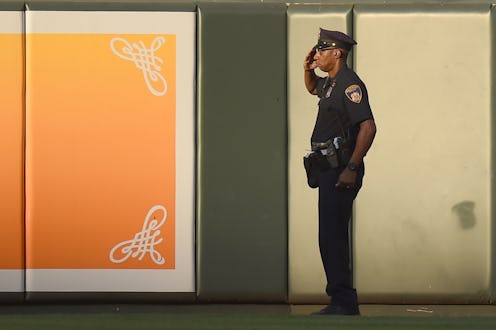News
Cop Beat By Suspect Wanted To Avoid Headlines
An Alabama police detective attacked by a suspect said he hesitated in striking first because he wanted to avoid becoming the next media headline, CNN reported on Friday. According to the detective, who requested to remain anonymous, 34-year-old Jenard Cunningham had been driving erratically on the freeway when the detective, who was on his way to interview a suspect, decided to pull him over. After calling for back-up to take his place so that he might head on to his assigned destination, the detective claimed Cunningham exited his vehicle and became aggressive with him. Rather than following standard protocol, however, the detective decided to avoid confronting Cunningham, and at some point in the altercation that followed, stated police records, Cunningham allegedly managed to grab the detective's gun.
"Within seconds, he was sucker-punched," said CNN correspondent Nick Valencia on Friday. Cunningham then allegedly began "beating [the detective] over the head with [the gun]," said Valencia. Police reported that the resulting gash on the detectives head required between 15 and 17 staples to close completely.
To make matters worse, as the detective lay on the ground bleeding, police said that bystanders — many of whom had watched the entire incident play out — pulled out their phones and began taking photos and video, rather than helping, posting mocking messages to social media.
The unnamed detective's fear of being pasted onto the headlines for potentially shooting his aggressor was a shared concern among the Birmingham Police, said spokesman Sgt. Heath Boackle.
"[Officers] are walking on eggshells because of how they're scrutinized in the media," Boackle told CNN, adding that the department was "thanking the good Lord because [the injured detective] could be dead right now."
The beating was the last thing the national community needed. Worse still, the reaction to it showed just how badly the relationship between police and civilians has soured in recent months. Instead of reaching out to help a wounded man, social media users took out their phones and laughed — and in the grand scheme of things, it's a huge step backward.
The current anti-police brutality movement, which shares intimate ties to the #BlackLivesMatter campaign, has done a lot in recent months to increase discussion over community and racial injustices, and has even prompted a handful of important federal Justice Department probes, several of which showed a distinct bias against ethnic minorities in cities across the country. Certainly, that discovery has opened up a slew of new questions over police procedure and screening or hiring processes.
But that doesn't negate the violence against law enforcement itself, and in the case of the Alabama detective and Cunningham, it has further proven that the need for greater, more meaningful communication between the two sides is paramount.
The #BlackLivesMatter movement and protests against police brutality have never, in their purest forms, been anti-cop; without positive law enforcement participation, neither would be able to make any headway, after all. But the rising trend of fringe violence has many worried that change is needed to see that the far ends of the spectrum don't drown out the real message of community and open dialogue.
Insensitivity of both sides of the issue not only hurts respective arguments, it causes lasting physical damage too. And in a movement this important, it's the worst possible outcome and has prompted law enforcement to lash out angrily in the press — a sentiment that, considering the circumstances, is not wholly unwarranted.
"You're only going to win a war if you have a good partnership, and right now the local police officers don't have that," said Boackle in an interview with AL.com on Saturday. "[This injured detective] was laying there lifeless and people were standing around taking pictures ... If the tables were turned, and that was a suspect lying there, they would be rioting."
